by Heather Kent | Oct 12, 2023
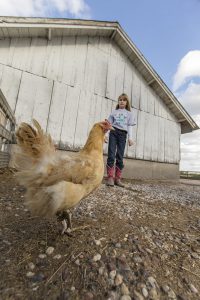 Because of our mild weather in Florida, nearly every season is fair season! County, regional, and state fairs occur throughout the fall, winter, and spring in our sunshine state. However, most county and regional fairs in the panhandle are in the fall. Fairs are an important component of the project experience. They provide opportunities for youth to demonstrate their project knowledge and skills. Livestock shows, judging contests, and exhibits are three ways youth are encouraged to develop communication and problem-solving skills associated with their project. To help our families prepare for the fair season, we have curated several resources:
Because of our mild weather in Florida, nearly every season is fair season! County, regional, and state fairs occur throughout the fall, winter, and spring in our sunshine state. However, most county and regional fairs in the panhandle are in the fall. Fairs are an important component of the project experience. They provide opportunities for youth to demonstrate their project knowledge and skills. Livestock shows, judging contests, and exhibits are three ways youth are encouraged to develop communication and problem-solving skills associated with their project. To help our families prepare for the fair season, we have curated several resources:
Livestock Shows- if you are new to livestock shows, you may feel a little overwhelmed. This article has some very helpful tips on making sure you are prepared- whether you are showing a large animal (such as a steer) or a small animal (such as a rabbit). The article also includes a downloadable packing list, as well as a list of supplies you may want to have on hand for a “show box.” A show box is a container where you store all of your show supplies.
Judging Contests– Juding contests help youth develop critical thinking skills. Fairs typically offer a variety of judging contests- from agriculture, livestock, poultry, horticulture, and even consumer choices. If you want to learn the basics of judging contests, check out this article and video. If you are interested in agriculture or livestock judging, check out this article for a list of free, downloadable resources and local judigng opportunities.
Exhibits– Fairs are a great way to show off what you have done throughout the 4-H year. From individual project exhibits to club booth exhibits, there is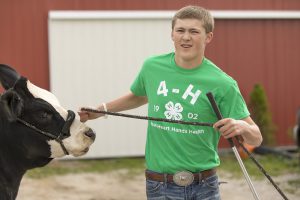 something for everyone. Check out our family guide to fair exhibits to know which types of exhibits are right for you! If you plan to submit exhibits to the North Florida Fair in Tallahassee, be sure to read this article which is a step-by-step guide to prepare your exhibits for that blue ribbon premium!
something for everyone. Check out our family guide to fair exhibits to know which types of exhibits are right for you! If you plan to submit exhibits to the North Florida Fair in Tallahassee, be sure to read this article which is a step-by-step guide to prepare your exhibits for that blue ribbon premium!
4-H Days at the Fair– most fairs offer a special day just for 4-H families. On this day, entrance into the fair is usually free for 4-Hers and features several judging contests and events to support 4-H project work. 4-H Day at the North Florida Fair is November 12th. Check out this article with tips and information you need to know before you go to 4-H day.
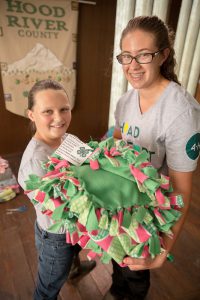 For more information about fairs in your area, or to help youth in your county make the most of thier local fair, contact your local UF IFAS County Extension Office.
For more information about fairs in your area, or to help youth in your county make the most of thier local fair, contact your local UF IFAS County Extension Office.
by Heather Kent | Oct 5, 2023
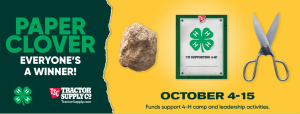 It is amazing how far a dollar can go- especially these days! Now through October 15, you can purchase a paper clover (or several) to help support your local program. Your donation will make a huge difference in the lives of local youth. In Florida, Tractor Supply Clover funds help send youth to camp and leadership events like 4-H Teen Retreat, 4-H Executive Board, iLead, 4-H University, 4-H Day at the Capitol, and 4-H Legislature. Don’t have a local Tractor Supply in your county? Don’t worry- a portion of all funds collected are distributed to counties that do not have a store so that everyone benefits!
It is amazing how far a dollar can go- especially these days! Now through October 15, you can purchase a paper clover (or several) to help support your local program. Your donation will make a huge difference in the lives of local youth. In Florida, Tractor Supply Clover funds help send youth to camp and leadership events like 4-H Teen Retreat, 4-H Executive Board, iLead, 4-H University, 4-H Day at the Capitol, and 4-H Legislature. Don’t have a local Tractor Supply in your county? Don’t worry- a portion of all funds collected are distributed to counties that do not have a store so that everyone benefits!
Since 2010, Tractor Supply has partnered with 4‑H to raise more than $14 million through the Paper Clover campaign. The success of these campaigns has impacted over 81,500 youth by providing them with the tools and resources they need to develop leadership skills to reach their full potential. For twelve days each April and October, Tractor Supply customers can purchase a paper clover to help local 4-H programs. One hundred percent of funds raised through the bi-annual Paper Clover campaign directly benefit 4‑H youth, with most funds benefiting local programs. For more information about 4-H, contact your local UF IFAS Extension office, or visit our website at https://florida4h.org.
Dates for the 2023 Fall Paper Clover Campaigns: Fall: October 4-15, 2023
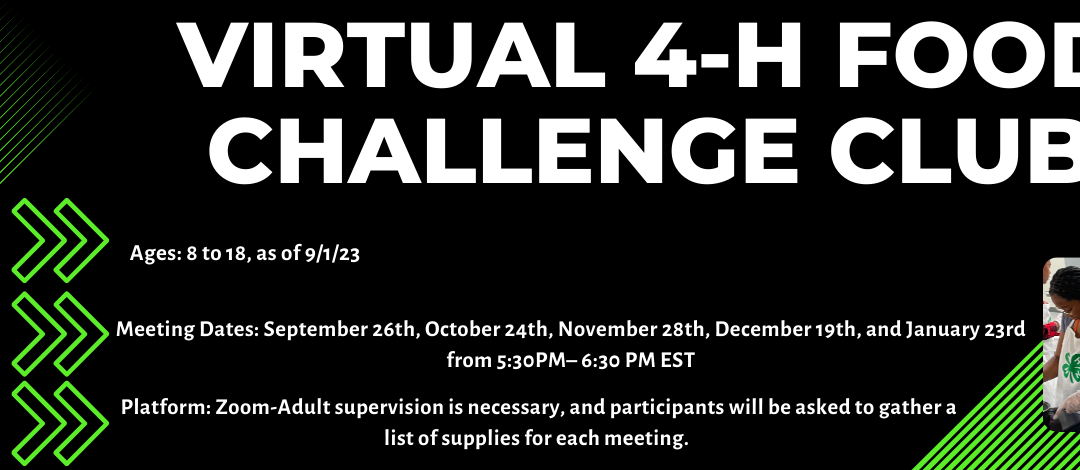
by pmdavis | Sep 14, 2023
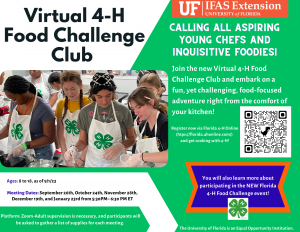
First meeting is Sept 26th at 5:30 EST
I am so thrilled to let you know about a new endeavor with Florida 4-H. We are trying a virtual Food Challenge cooking club this year. This is so exciting for me because some of my fondest memories are cooking with my grandmother and Mom. I got to learn how to prepare foods and be creative as I was growing up pulling on their apron strings. I also enjoyed teaching and sharing these skills with my own children. What makes this even better is now I get to share and learn with all of you who join our program.
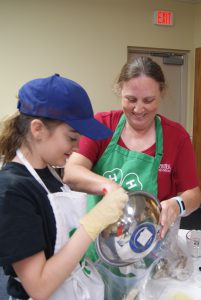
Paula and Madelyn Cooking together
By joining the new Virtual 4-H Food Challenge Club, you will embark on a fun, yet challenging, food-focused adventure right from the comfort of your kitchen! The club adventure will provide a fun atmosphere for you and your children to have a family time experience building lasting memories together. With the help from Florida 4-H Youth Development Faculty, you will get to unleash your culinary creativity and try delicious recipes while learning kitchen skills from safety, nutrition, and other food related life skills. Families will learn about competitive events related to foods like the Florida Food Challenge Competition. Families will also have the opportunity to make friends with fellow 4-H members across the state.
The virtual club is open to youth members ages 8-18 and will meet once a month starting in September. The club will meet via ZOOM on the following Tuesdays: September 26th, October 24th, November 28th, December 19th, and January 23rd from 5:30 – 6:30 PM ET. We request that adult supervision is present with the youth during the meeting and home practice sessions. The participants will be asked to gather a list of supplies for each monthly meeting as we focus on a new skill for each meeting.
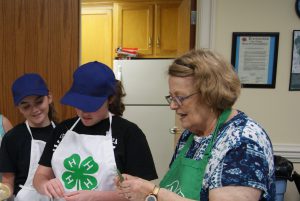
Paula’s family working with herbs to prepare a dish.
During this course we will help families enjoy preparing food, provide you with opportunities to problem solve together and work as a family team as practice preparation for the Florida 4-H Food Challenge! If you join us, your family will learn how to prepare and create yummy dishes with a predetermined set of ingredients. By the end of the program, your family should have some new recipes for your cooking toolbox, learned essential cooking skills and created wonderful memories from your time together. Do not miss this flavorful opportunity – sign up now via Florida 4-H Online and get cooking with 4-H! If you are not a member of a current 4-H Club there is a $20 membership fee associated with this club. If you are unable to join our virtual club, contact your local UF/IFAS Extension office to see if there is an active Food Challenge group that you can join. If not, work with your 4-H or FCS Agent(s) to identify two caring adults who could fill this role.
Enroll, Grab your ingredients, and get ready to join us via Zoom on September 26th@ 5:30 EST
by Heather Kent | Sep 7, 2023
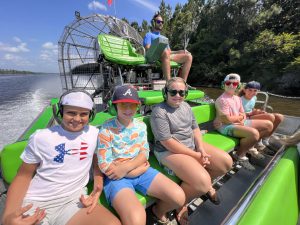
4-H youth explored different Florida habitats to learn about species.
Thanks to Fish Florida, 4-H youth across the panhandle are exploring their sparks related to fishing and Florida’s natural resources. Fish Florida supports organizations like 4-H that teach people, especially children, about Florida’s fish and aquatic habitats through donations of fishing equipment, grants, and scholarships. Their mission is to promote public awareness of and encourage the protection of marine fisheries and coastal habitats through non-formal education. Because their mission aligns so well with the mission of Florida 4-H, this partnership has been very successful.
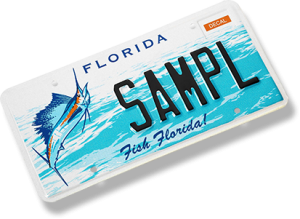
Fish Florida grants are supported through the sales of specialty tags.
Six Florida panhandle counties received equipment and funds to support 4-H fishing clubs and day camps, reaching 43 adult volunteers and nearly 200 youth. Through these programs, 4-H faculty, staff, and volunteers taught young people about different types of fishing equipment, how to rig a rod and reel, how to cast, how to tie different types of fishing knots, how to identify Florida fresh and saltwater fish, how to fish ethically (following Florida Fish and Wildlife regulations), water and boating safety, and more.
One 4-H youth shared, “I always enjoyed going fishing before, but now I understand what types of equipment and bait I need to use to catch the type of fish I like to catch. This program has also helped me understand why we have certain regulations to protect Florida habitats.”
Youth participating in the 4-H sportfishing program had the opportunity to visit a variety of Florida habitats to learn about different fish, including salt water, brackish water, and freshwater. They also met with professionals in the fishing and wildlife industries to learn about potential careers related to the fishing industry, as well as conserving Florida’s unique natural habitats. This program would not have been possible without the support from Fish Florida, which is funded through the sales of the Florida Sailfish specialty license plate.
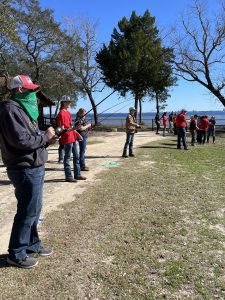
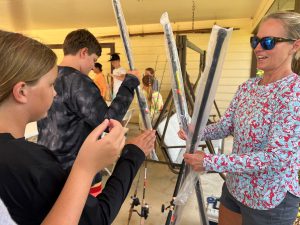
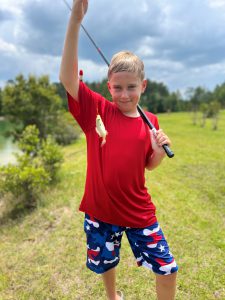
4-H programs in Florida’s panhandle provide several ways for youth to explore their interests related to fishing and the outdoors:
- Clubs- Youth can participate in 4-H clubs that are focused on fishing, natural resources, and the outdoors (shooting sports, ATV safety, camping). Clubs are the foundation of 4-H. A 4-H club is a group of five or more youngsters guided by one or more adults. A club can be any size–from a small group of kids from the same neighborhood to a large group of youth from within the county. Clubs typically meet at least once a month to participate in activities to learn more about a topic. These activities might include games, field trips, guest speakers, and contests. To learn more about what a 4-H club is, visit our website.
- Day Camps– Many counties offer day camps focused on fishing and the outdoors. These are typically held during the summer months, or on non-school days. Day camps are a great way for youth who are new to 4-H to get a feel for what 4-H offers.
- Residential Camps– 4-H Camp Timpoochee in Niceville, FL offers residential camps to help youth explore Florida’s environments. This camp is the oldest 4-H camp in Florida and is located on the Choctwhathatchee Bay.
- School Programs– Counties offer a variety of programs through the schools to support non-formal learning. One of these programs is the Florida Youth Naturalists. The Florida Youth Naturalists program guides youth through an exploration of Florida’s uplands, wetlands, and coastal ecosystems and was inspired by the Master Naturalist Program, which is targeted toward adults.
- Contests– Youth can also participate in contests related to the fields of conservation and ecology such as the 4-H Wildlife Ecology Contest at the North Florida Fair. Activities and study guides to prepare for 4-H Wildlife Ecology can be found online. The deadline to register for the 4-H Wildlife Ecology Contest is October 13. Another contest related to outdoor education is the 4-H Forest Ecology Contest. A clinic to prepare for the State 4-H Forest Ecology Contest will be held on October 14th, and the deadline to register for the clinic is September 23 in 4HOnline.
Check out our 4-H Sportfishing Project Page to learn more about our programs related to fishing. To learn more about Fish Florida, or how you can support them through the Sailfish License Plate program, visit their website. To learn more about opportunities for you to share your passion for fishing with the next generation, or to get your child involved, contact your local UF IFAS County Extension Office.
by Heather Kent | Aug 4, 2023
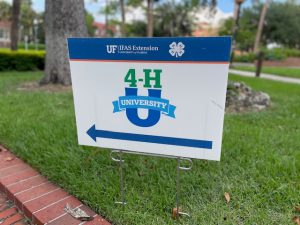 This week, 4-Hers from across Florida came together for an event known as 4-H University. This event was formerly known as 4-H Congress, and 4-H Shortcourse (back in the 40’s and 50’s). It is an opportunity for high school youth to showcase project knowledge, practice leadership skills, participate in our state officer election process, and engage in service projects and workshops to explore their sparks and potential careers. This blog post is written from the perspective of a parent of a first-time youth participant.
This week, 4-Hers from across Florida came together for an event known as 4-H University. This event was formerly known as 4-H Congress, and 4-H Shortcourse (back in the 40’s and 50’s). It is an opportunity for high school youth to showcase project knowledge, practice leadership skills, participate in our state officer election process, and engage in service projects and workshops to explore their sparks and potential careers. This blog post is written from the perspective of a parent of a first-time youth participant.
Day 1: The Florida 4-H Foundation provided a charter bus to transport panhandle youth to and from Gainesville. But it wasn’t just any bus- it was a customized Florida Gator bus! While I personally am not a Gator Fan, it was impressive and made our young people feel special. Having a charter bus also alleviated some of the stress (and expense) on parents, 4-H agents, and volunteers and made compliance with our youth protection policy much easier!
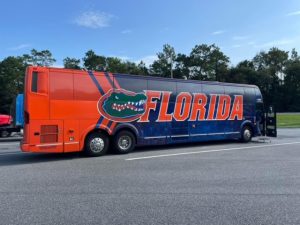
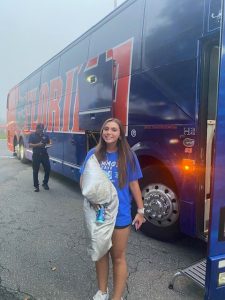
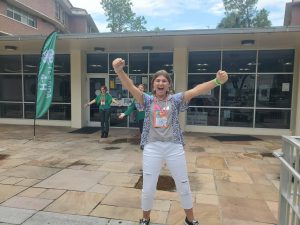
Once the youth arrived, they checked into their dorms, unpacked, and selected their workshops for the week. Workshops are structured to help youth explore their passions and interests, and learn about potential careers connected to their sparks. Workshops are hosted by UF faculty across several different departments- animal science, entomology, food sciences, engineering, and more!
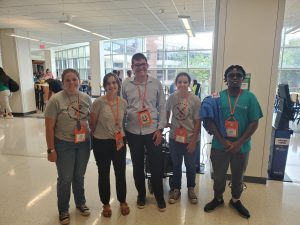
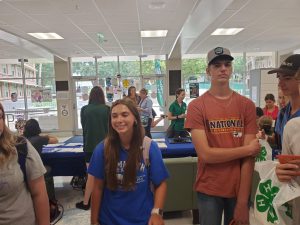
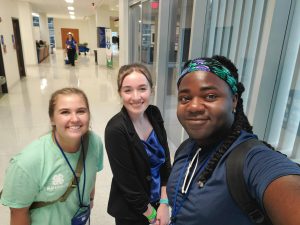
Some youth also competed in state contests such as public speaking, demonstrations, or illustrated talks. Entries for the state photographic and graphic design contests were on display. Youth also listened to speeches prepared by candidates running for office for the Florida 4-H Executive Board. This year we had a record number of candidates- 19 for five positions (president, vice president, secretary, treasurer, and reporter). The opening event was held at a recreational center where youth had the opportunity to skate, ride go-carts, rock climb, and get to know each other.
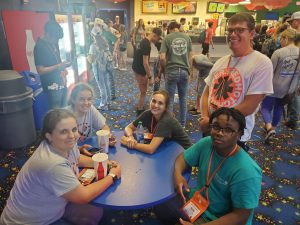
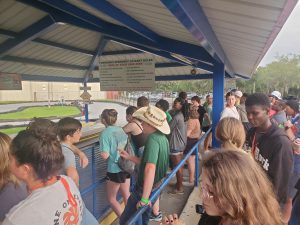

Day 2: Youth participated in service projects and workshops.
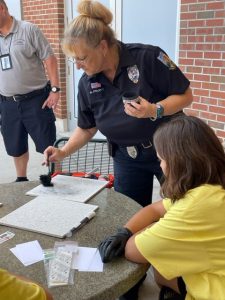
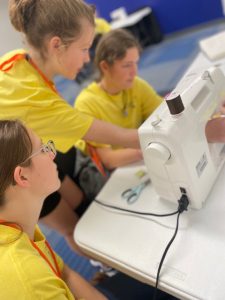
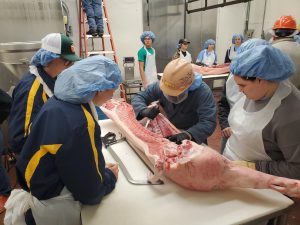
Dinner on day 2 was enjoyed at “The Swamp,” also known as the Ben Hill Griffin Stadium. This was sponsored by the College of Agricultural and Life Sciences.

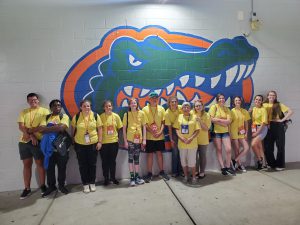
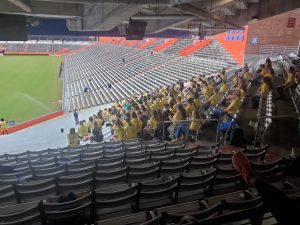
After dinner, the state Share the Fun talent contest took place and was live-streamed on social media. This was followed by a dance before returning to the dorms.
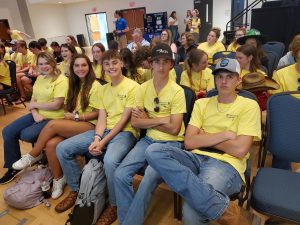
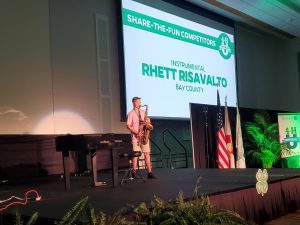
Day 3: Youth participated in more workshops, and voting delegates from each county participated in a State Executive Board Meeting and cast their votes for state officers. That evening, awards for scholarships and national trips were presented during a banquet, and the new officers were inducted. This celebration was followed by a dance.
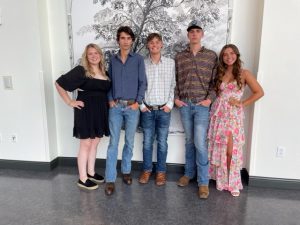
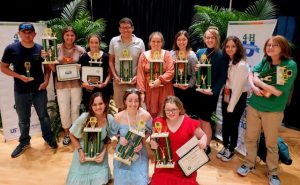
Day 4: The event was concluded with an Awards Breakfast and parade of champions, where all winners from all state events that occurred throughout the year were acknowledged. After breakfast, there was a Florida 4-H Hall of Fame Induction Ceremony, and youth loaded back up on the bus to head home!
4-H University usually occurs the last week of July. For more information, check out our website or contact your local UF/IFAS County Extension Office.

by lauenc | Jun 30, 2023
As summer approaches and the days grow longer, it’s the perfect time to engage 4-H youth in outdoor activities that blend fun, learning, and teamwork. One exciting way to accomplish this is to organize a tailgating (grilling) camp and grilling exhibition in preparation for your District 4-H Tailgating Contest. 4-H Agents and volunteers have a unique opportunity to guide young participants in the art of grilling while instilling valuable life skills and fostering a sense of camaraderie. In this blog post, we will explore the benefits of incorporating a tailgating (grilling) competition into your summer programming.

Building Life Skills: Grilling is not just about cooking delicious food; it also teaches various life skills that are essential for personal and professional growth. By incorporating a tailgating competition into your summer programming, you can help young participants develop skills such as teamwork, leadership, communication, time management, and problem-solving. These skills are valuable in all aspects of life and will benefit them in the long run.
Fostering Creativity: Tailgating competitions offer a platform for youth to unleash their creativity. Encourage participants to come up with unique recipes, experiment with flavors, and showcase their grilling techniques. This will not only boost their confidence, but also stimulate their culinary imagination. Remember to emphasize the importance of food safety and hygiene throughout the process.
Encouraging Healthy Eating: While contest participants are limited to pork, beef, chicken, and shrimp during the actual competitions, you can use the tailgating competition as an opportunity to promote healthy eating habits among youth. Encourage participants to incorporate nutritious ingredients such as lean proteins, fresh vegetables, and whole grains into their recipes. Teach them about the benefits of balanced meals and provide resources on how to make healthier choices when grilling.
Creating a Sense of Community: Organizing a tailgating competition brings people together and creates a sense of community among participants. Encourage teams or individuals to share their grilling experiences, techniques, and recipes with one another. This fosters a supportive environment where everyone can learn from each other and build lasting connections.
In June 2023, Holmes County 4-H added another element to their annual 4-H Tailgating Summer Day Camp by including a public grilling exhibition and competition. The event was held in conjunction with Peppertown Market, a monthly community-wide street market in downtown Bonifay. Holmes County 4-H youth had an opportunity to hear constructive criticism and words of encouragement from judges and volunteers as they competed for a spot at the Northwest District Tailgating Contest. The grills and youth were strategically placed to create a high impact opportunity to boost awareness of Holmes County 4-H. Event attendees had the opportunity to speak with 4-H volunteers and the 4-H Agent to obtain resources and learn more about Holmes County 4-H. Volunteers also utilized the event as a fundraising opportunity by selling peach cobbler made in a Dutch oven on location near our 4-H youth that were grilling. Proceeds were used to offset the costs associated with the Tailgating Camp and Grilling Exhibition.
Incorporating a tailgating camp and grilling exhibition into your summer programming offers numerous benefits for youth development. By teaching grilling skills, fostering creativity, promoting healthy eating, and creating a sense of community, you can inspire young participants to embrace outdoor cooking as a lifelong hobby. Remember to prioritize fire safety, provide access to reliable resources, and encourage participants to explore various grilling techniques. With your guidance, they will light the fire for grilling success and create memorable experiences that extend beyond the summer months.
The 2023 Florida 4-H Northwest District Tailgating Contest will be held in Chipley, Florida on July 22, 2023. Winners from the each of the District contests will be invited to compete at the State Contest on Saturday, September 23, 2023 in Gainesville, Florida.
Contact your local 4-H Agent and visit Tailgate Contest – Florida 4-H – University of Florida, Institute of Food and Agricultural Sciences – UF/IFAS (ufl.edu) to explore a wide variety of informative resources that can help “spark” a passion for food science and fire safety.
- Region 1 | Northwest District Contest
| Key Questions |
Information |
| When |
Saturday, July 22, 2023 |
| Where |
Washington County Agricultural Center, 1424 Jackson Ave, Chipley, FL 32428 Counties |
| Registration |
May 5 to July 15, 2023 |
| Grill Setup |
Grill setup will be from 9:15 a.m. CDT to 10 a.m. CDT with grills starting at 10:15 a.m. CDT. |
| Counties |
Bay, Calhoun, Escambia, Franklin, Gadsden, Gulf, Holmes, Jackson, Jefferson, Leon, Liberty, Okaloosa, Santa Rosa, Wakulla, Walton, Washington |
| Coordinators |
Mark Mauldin, mdm83@ufl.edu, & Brian Estevez, bestevez@ufl.edu |
 Because of our mild weather in Florida, nearly every season is fair season! County, regional, and state fairs occur throughout the fall, winter, and spring in our sunshine state. However, most county and regional fairs in the panhandle are in the fall. Fairs are an important component of the project experience. They provide opportunities for youth to demonstrate their project knowledge and skills. Livestock shows, judging contests, and exhibits are three ways youth are encouraged to develop communication and problem-solving skills associated with their project. To help our families prepare for the fair season, we have curated several resources:
Because of our mild weather in Florida, nearly every season is fair season! County, regional, and state fairs occur throughout the fall, winter, and spring in our sunshine state. However, most county and regional fairs in the panhandle are in the fall. Fairs are an important component of the project experience. They provide opportunities for youth to demonstrate their project knowledge and skills. Livestock shows, judging contests, and exhibits are three ways youth are encouraged to develop communication and problem-solving skills associated with their project. To help our families prepare for the fair season, we have curated several resources: something for everyone. Check out our family guide to fair exhibits to know which types of exhibits are right for you! If you plan to submit exhibits to the North Florida Fair in Tallahassee, be sure to read this article which is a step-by-step guide to prepare your exhibits for that blue ribbon premium!
something for everyone. Check out our family guide to fair exhibits to know which types of exhibits are right for you! If you plan to submit exhibits to the North Florida Fair in Tallahassee, be sure to read this article which is a step-by-step guide to prepare your exhibits for that blue ribbon premium! For more information about fairs in your area, or to help youth in your county make the most of thier local fair, contact your local UF IFAS County Extension Office.
For more information about fairs in your area, or to help youth in your county make the most of thier local fair, contact your local UF IFAS County Extension Office. 






























